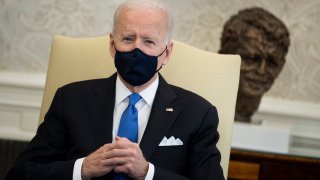
- The $7.5 billion tariffs on EU products and $4 billion duties on U.S. goods are now on hold for four months as both sides look to draw up a deal that will include a permanent solution over support for the aircraft sector.
- European officials have said the announcement marks a "reset" in trans-Atlantic relations after four fractious years under the Trump presidency, but some analysts are not convinced.
- There are also some sensitivities over how to deal with China and Russia.
LONDON — The U.S. and the European Union might have reached a trade truce, but some analysts have doubts over whether the two sides will be able to agree on other contentious issues such as digital taxation and relations with China.
U.S. President Joe Biden and European Commission President Ursula von der Leyen announced on Friday a suspension of tariffs imposed during the Trump presidency over aircraft subsidies. The dispute first emerged in 2004 and the World Trade Organization ruled in 2019 and 2020 that the U.S. and the EU had granted illegal support to Boeing and Airbus, respectively.
The $7.5 billion tariffs on EU products and $4 billion duties on U.S. goods are now on hold for four months as both sides look to draw up a deal that will include a permanent solution over support for the aircraft sector.
European officials have said the announcement marks a "reset" in trans-Atlantic relations after four fractious years under the Trump presidency, but some analysts are not convinced.
"The tariff suspension is a first step to defrost trade relations between Europe and the United States, and hopefully a sign that these tariffs will be taken away altogether soon," Fredrik Erixon, trade expert at the ECIPE think tank, told CNBC on Monday.
Money Report
"I'm less convinced that the suspension signals a completely new orientation in transatlantic trade, with new agreements to support more economic integration."
Tech giants
One particularly contentious issue is how some of the world's biggest tech companies are taxed.
The EU and the U.S. have been at odds over this matter, as well as security concerns around 5G, for years. But since Biden arrived at the White House, the EU is confident that some of these disagreements can be overcome.
In fact, the U.S. has opened the door toward a deal over digital taxation, which the Organization for Economic Cooperation and Development aims to conclude this summer.
But Biden has not departed from all of his predecessor's policies completely. He has implemented the Buy American First initiative, to incentivize manufacturing in the country and to boost the overall economy as the coronavirus pandemic takes its toll on the world's largest economic power.
In the meantime, the EU has also stepped up discussions over strategic autonomy, aiming to reduce its reliance on certain parts of the world.
"Both sides are raising their economic protection against the world economy. In the U.S. by new Buy America polices, for instance, and in Europe by a general campaign to wean itself off its technology dependence on the U.S.. Both sides say they want to take trasatlanticism into a new age, but for that to happen they would first have to resolve controversial issues like digital taxes and new technology frictions," ECIPE's Erixon said.
China and Russia
In addition, there are also some sensitivities over how to deal with China and Russia.
The EU signed an investment deal with Beijing just weeks before Biden was inaugurated, despite fears the 27-member bloc could be jeopardizing its relationship with the new president. At the same time, some American lawmakers believe the EU is not assertive enough when it comes to human rights issues in China.
The U.S. also opposes the gas pipeline being built from Russia to Europe and has sanctioned some firms involved in the project.
However, in a press statement Friday, after a phone call with Biden, von der Leyen said, "We share a strategic outlook on Russia."
Holger Schmieding, chief European economist at Berenberg, told CNBC on Monday that the next item on the trans-Atlantic to-do list could be "attempts to defuse the conflict about the Nordstream 2 pipeline."
Carsten Brzeski, economist at ING in Germany, also said that the tariff suspension "doesn't mean that everything will be fine, there are still many stumble blocks ahead like Nordstream and how to deal with China."
But in the meantime, European exporters can breathe a tentative sigh of relief, at a time when the region is facing a severe economic crisis.
"Last week's news is good news and takes away a short-term risk for the economy we always have had to count in during the last four years," Brzeski added.






